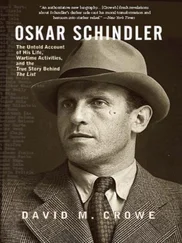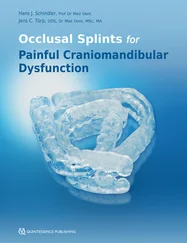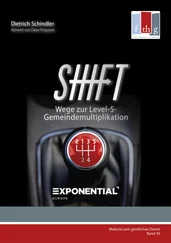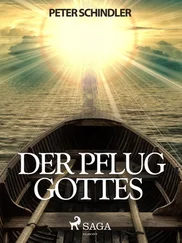In that warm hole under the factory, night and day were irrelevant. The time the door at the top of the cellar stairs burst open could have been either. She was used to quieter visits from Emilie Schindler. She heard boots on the stairs and tensed in her bed. It sounded to her like an old-fashioned Aktion.
It was in fact the Herr Direktor with two officers from Gróss-Rosen. Their boots clattered on the steps as if to stampede over her. Oskar stood with them as they looked around in the gloom at the boilers and at her. It came to Lusia that perhaps she was it for today. The sacrificial offering you had to give them so that they would go away satisfied. She was partially hidden by a boiler, but Oskar made no attempt to conceal her, actually came to the foot of her bed.
Because the two gentlemen of the SS seemed flushed and unsteady, Oskar had a chance to speak to her. His were words of wonderful banality, and she would never forget them: “Don’t worry. Everything’s all right.” He stood close, as if to emphasize to the inspectors that this was not an infectious case.
“This is a Jewish girl,” he said flatly.
“I didn’t want to put her in the Krankenstube. Inflammation of the joints. She’s finished anyway. They don’t give her more than thirty-six hours.”
Then he rambled on about the hot water, where it came from, and the steam for the delousing. He pointed to gauges, piping, cylinders. He edged around her bed as if it too were neutral, part of the mechanism. Lusia did not know where to look, whether to open or close her eyes. She tried to appear comatose. It might seem a touch too much, but Lusia did not think so at the time, that as he ushered the SS men back to the base of the stairs, Oskar flashed her a cautious smile. She would stay there for six months and hobble upstairs in the spring to resume her womanhood in an altered world.
During the winter, Oskar built up an independent arsenal. Again there are the legends: Some say that the weapons were bought at the end of winter from the Czech underground. But Oskar had been an obvious National Socialist in 1938 and 1939 and may have been wary of dealing with the Czechs. Most of the weapons, in any case, came from a flawless source, from Obersturmbannführer Rasch, SS and police chief of Moravia. The small cache included carbines and automatic weapons, some pistols, some hand grenades. Oskar would later describe the transaction offhandedly. He acquired the arms, he would say, “under the pretense of protecting my factory, for the price of the gift of a brilliant ring to his [Rasch’s] wife.”
Oskar does not detail his performance in Rasch’s office in Brno’s Spilberk Castle. It is not hard to imagine, though. The Herr Direktor, concerned about a possible slave uprising as the war grinds on, is willing to die expensively at his desk, automatic weapon in hand, having mercifully dispatched his wife with a bullet to save her from something worse. The Herr Direktor also touches on the chance that the Russians might turn up at the gate.
My civilian engineers, Fuchs and Schoenbrun, my honest technicians, my German-speaking secretary, all of them deserve to have the means of resistance. It’s gloomy talk, of course. I’d rather speak of issues closer to our hearts, Herr Obersturmbannführer. I know your passion for good jewelry. May I show you this example I found last week?
And so the ring appeared on the edge of Rasch’s blotter, Oskar murmuring, “As soon as I saw it, I thought of Frau Rasch.”
Once Oskar had the weapons, he appointed Uri Bejski, brother of the rubber-stamp maker, keeper of the arsenal. Uri was small, handsome, lively. People noticed that he wandered into and out of the Schindlers’ private quarters like a son. He was a favorite, too, with Emilie, who gave him keys to the apartment. Frau Schindler enjoyed a similar maternal relationship with the surviving Spira boy. She took him regularly into her kitchen and fed him up on slices of bread and margarine.
Having selected the small body of prisoners for training, Uri took one at a time into Salpeter’s storehouse to teach them the mechanisms of the Gewehr 41 W’s. Three commando squads of five men each had been formed. Some of Bejski’s trainees were boys like Lutek Feigenbaum. Others were Polish veterans such as Pfefferberg and those other prisoners whom the Schindler prisoners called the “Budzyn people.”
The Budzyn people were Jewish officers and men of the Polish Army. They had lived through the liquidation of the Budzyn labor camp, which had been under the administration of Untersturmführer Liepold. Liepold had brought them into his new command in Brinnlitz. There were about 50 of them, and they worked in Oskar’s kitchens. People remember them as very political. They had learned Marxism during their imprisonment in Budzyn, and looked forward to a Communist Poland. It was an irony that in Brinnlitz they lived in the warm kitchens of that most apolitical of capitalists, Herr Oskar Schindler.
Their rapport with the bulk of the prisoners, who, apart from the Zionists, merely followed the politics of survival, was good. A number of them took private lessons on Uri Bejski’s automatics, for in the Polish Army of the Thirties they had never held such sophisticated weapons.
If Frau Rasch, in the last and fullest days of her husband’s power in Brno, had idly—during a party, say; a musical recital at the castle—gazed into the core of the diamond that had come to her from Oskar Schindler, she would have seen reflected there the worst incubus from her own dreams and her Führer’s. An armed Marxist Jew.
Old drinking friends of Oskar’s, Amon and Bosch among them, had sometimes thought of him as the victim of a Jewish virus. It was no metaphor. They believed it in virtually literal terms and attached no blame to the sufferer. They’d seen it happen to other good men. Some area of the brain fell under a thrall that was half-bacterium, half-magic. If they’d been asked whether it was infectious, they would have said, yes, highly. They would have seen the case of Oberleutnant Sussmuth as an example of conspicuous contagion.
For Oskar and Sussmuth connived over the winter of 1944-45 to get a further 3,000 women out of Auschwitz in groups of 300 to 500 at a time into small camps in Moravia. Oskar supplied the influence, the sales talk, the palm-greasing for these operations. Sussmuth did the paperwork. In the textile mills of Moravia there was a labor shortage, and not all the owners abhorred the Jewish presence as sharply as Hoffman. At least five German factories in Moravia—at Freudenthal and Jagerndorf, at Liebau, Grulich, and Trautenau—took these drafts of women and supplied a camp on the premises. Any such camp was never paradise, and in its management the SS were permitted to be more dominant than Liepold could ever hope to be. Oskar would later describe these women in the little camps as “living under endurable treatment.” But the very smallness of the textile camps was an aid to their survival, for the SS garrisons were older, slacker, less fanatical men. There was typhus to be eluded, and hunger to be carried like a weight beneath the ribs. But such tiny, almost countrified establishments would for the most part escape the extermination orders that would come to the bigger camps in the spring.
But if the Jewish sepsis had infected Sussmuth, for Oskar Schindler it galloped. Through Sussmuth, Oskar had applied for another 30 metalworkers. It is simple fact that he had lost interest in production. But he saw, with the detached side of his mind, that if his plant was ever to validate its existence to Section D, he would need more qualified hands. When you look at other events of that mad winter, you can see that Oskar wanted the extra 30 not because they were used to lathes and machine tools, but because they were simply an extra 30. It is not too fantastic to say that he desired them with some of the absolute passion that characterized the exposed and flaming heart of the Jesus which hung on Emilie’s wall. Since this narrative has tried to avoid the canonization of the Herr Direktor, the idea of the sensual Oskar as the desirer of souls has to be proved.
Читать дальше












